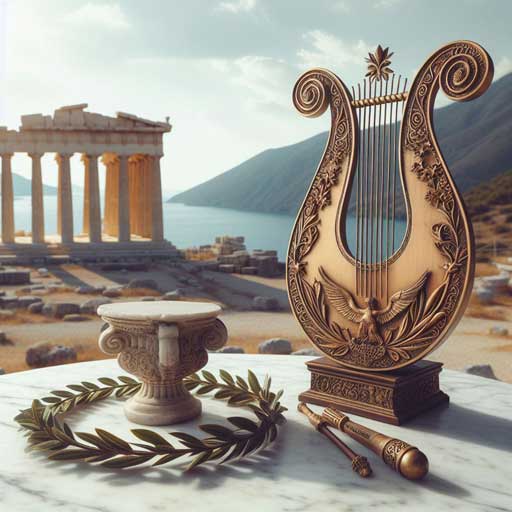Unveiling Apollo: Exploring the Myths and Symbols of the Greek God
Introduction:
Apollo, the radiant Greek god of light, music, prophecy, and healing, stands as a beacon of divine inspiration and artistic prowess in ancient mythology. From his lofty perch atop Mount Olympus to his revered sanctuaries across Greece, Apollo's influence transcends mortal boundaries. Join us on a journey through the mythological tapestry of Apollo as we unravel the mysteries of his divine domain and explore the captivating symbiosis between Apollo and his twin sister, Artemis.
Explore Further:
- Apollo: The Divine Luminary
- The Symbols of Apollo
- Apollo and Artemis: Twin Flames of Olympus
- Apollo in Rhodes
- Apollo's Relation with Heroes
- Apollo's Powers
- Conclusion
Apollo: The Divine Luminary:
In the pantheon of Greek deities, Apollo reigns supreme as the god of light and the sun. Known for his unparalleled beauty and grace, Apollo's radiance illuminates the heavens and bestows life-giving warmth upon the earth. His Roman counterpart, known as Apollo in Latin, ensures his timeless legacy spans across cultures and civilizations.
The Symbols of Apollo:
As the god of light and prophecy, Apollo is often depicted with symbolic attributes that reflect his multifaceted nature. The lyre, a stringed musical instrument, symbolizes Apollo's mastery of music and poetry, inspiring creativity and harmony among mortals. The laurel wreath, a symbol of victory and achievement, adorns Apollo's brow, signifying his triumphs in battle and his divine favor.

Apollo and Artemis: Twin Flames of Olympus:
Apollo's bond with his twin sister, Artemis, is one of the most enduring and enchanting relationships in Greek mythology. As the goddess of the hunt and wilderness, Artemis complements Apollo's radiant presence with her fierce independence and untamed spirit. Together, they roam the forests of Mount Olympus, their divine connection echoing in the harmonious symphony of nature.
Apollo in Rhodes:
Among the many sanctuaries dedicated to Apollo, none are as renowned as the Colossus of Rhodes, one of the Seven Wonders of the Ancient World. This colossal statue, erected in honor of Apollo Helios, the sun god, stood as a testament to the island's reverence for the divine patron of light and enlightenment.

Apollo's Relation with Heroes:
Apollo's influence extends beyond the realm of the divine, as he often interweaves his destiny with that of mortal heroes. From aiding heroes on their quests to testing their mettle with trials and tribulations, Apollo's interactions with legendary figures leave an indelible mark on Greek mythology.
-
Apollo and Heracles: In the renowned Twelve Labors of Heracles, Apollo plays a significant role, both as an adversary and an ally. From slaying the monstrous Python, a creature associated with Apollo's sanctuary at Delphi, to aiding Heracles in his quest to capture the Ceryneian Hind, Apollo's presence looms large in the hero's legendary exploits.
-
Apollo and Orpheus: The legendary musician and poet Orpheus, gifted with unparalleled musical talent, is said to be a son of Apollo. Apollo's divine heritage imbues Orpheus with extraordinary abilities, enabling him to charm even the gods themselves with his enchanting melodies.
- Apollo and Achilles: In Homer's epic poem, the "Iliad," Apollo plays a pivotal role in the fate of the heroic warrior Achilles. Stricken by Apollo's arrows, Achilles is forced to confront his mortality and grapple with the inevitability of death, ultimately leading to his tragic downfall.
Apollo's Powers:
Apollo, as one of the Olympian gods, possesses a vast array of powers and abilities that reflect his divine nature:
-
Solar Radiance: Apollo's primary domain is the sun itself, radiating light and warmth across the cosmos. As the god of light, he controls the movement of the sun, bringing daylight to the mortal world and illuminating the heavens.
-
Prophecy: Apollo is renowned for his gift of prophecy, bestowing foresight and divine knowledge upon mortals through his Oracle at Delphi. Those who seek guidance from Apollo's oracle receive cryptic yet profound insights into their destinies.
-
Healing: Apollo is also revered as a god of healing, capable of curing diseases and ailments with his divine touch. His sanctuaries, known as "asclepions," serve as centers of holistic healing and spiritual rejuvenation.
-
Music and Poetry: Apollo's musical prowess is unparalleled among the gods. He is often depicted with a golden lyre, which he uses to create enchanting melodies that soothe the soul and inspire creativity. Apollo's poetry is equally renowned, with his verses echoing through the ages as a testament to his artistic genius.
-
Archery: As a skilled archer, Apollo wields his silver bow with deadly accuracy. He is often portrayed in mythological stories as a formidable warrior, using his bow to defend Mount Olympus and uphold justice.
-
Protection of Young Life: Apollo is the protector of young life, safeguarding children and guiding them through the trials of youth. He watches over newborns and ensures their safe passage into the world, blessing them with vitality and vitality.

Conclusion:
As we conclude our exploration of Apollo, the illustrious Greek god of light and creativity, let us marvel at the enduring legacy of this divine luminary. From his sacred sanctuaries to his timeless myths and symbols, Apollo continues to inspire awe and reverence among mortals, beckoning us to embrace the boundless possibilities of artistic expression and spiritual enlightenment.

